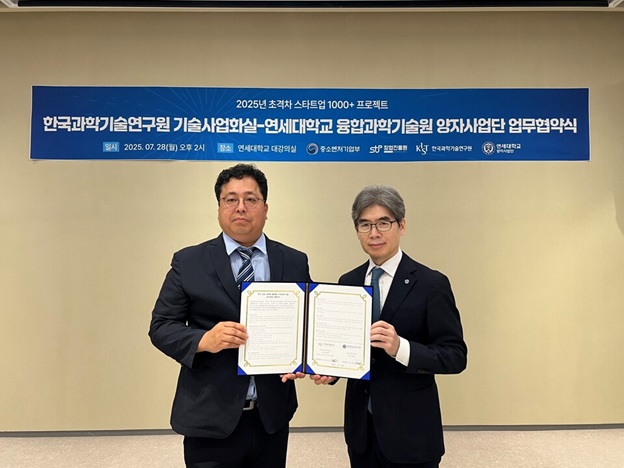Yonsei University and the Korea Institute of Science and Technology (KIST) have joined forces to build a startup ecosystem powered by quantum technologies.
On the 28th, the two institutions signed a memorandum of understanding at the Quantum Convergence Research Center at Yonsei University’s International Campus. The agreement, the “Super-Gap Startup 1000+ Project,” led by the Ministry of SMEs and Startups and the Korea Institute of Startup & Entrepreneurship Development, marks a milestone in Korea’s startup landscape by uniting a university and a government research institute in the advanced field of quantum computing.
The partnership, led by Yonsei University’s Quantum Business Group and the Korea Institute of Science and Technology (KIST)’s Technology Commercialization Department, aims to accelerate the growth of startups in the field of quantum innovation. Key areas of collaboration include shared use of quantum computing infrastructure for technology validation, joint discovery and support of early-stage companies, and programs for talent exchange and education. The two institutions plan to establish a practical model for collaboration between academia, research, and industry.
A key feature of the agreement is that startups will gain direct access to quantum computing systems for real-world testing. At the center of the initiative is Korea’s first on-premises IBM 127-qubit quantum computer, recently installed at Yonsei University. Providing private startups with access to such high-performance infrastructure marks an unprecedented move in Korea’s tech ecosystem, highlighting the project’s pioneering significance.
The system will be applied to industrial projects by KIST-affiliated companies, selected “Super-Gap Startups” in the quantum field, and Post-TIPS firms located in the Hongneung Special R&D Zone.
To prepare startups for practical use, the two organizations will also provide joint consulting and strategic guidance, ensuring systematic support from technology validation to commercialization. This framework is intended to transform research outputs into market-ready products and services, representing a shift from simple technology transfer to strategic business partnership.
Jae Ho Cheong, Director of Yonsei’s Quantum Business Division, said, “Through the IBM 127-qubit quantum computer, we are making tangible collaboration among universities, research institutes, and startups a reality. We hope this agreement becomes a central driving force in expanding Korea’s quantum technology ecosystem.”
Sunjoon Kang, head of KIST’s Technology Commercialization Department, added, “Providing deep-tech startups with direct access to a quantum computer is in itself a groundbreaking model. We will fully support this effort so that it can be remembered as a case where barriers between universities and research institutes were truly broken down.”
The agreement encompasses not only technology development but also verification, education, and resource sharing necessary for commercialization. As a result, the partnership is expected to serve as a hub enabling quantum technology startups to enter the market and scale more rapidly. Observers now watch closely to see whether this initiative will help establish a more sustainable and multidimensional foundation for Korea’s quantum computing industry.


